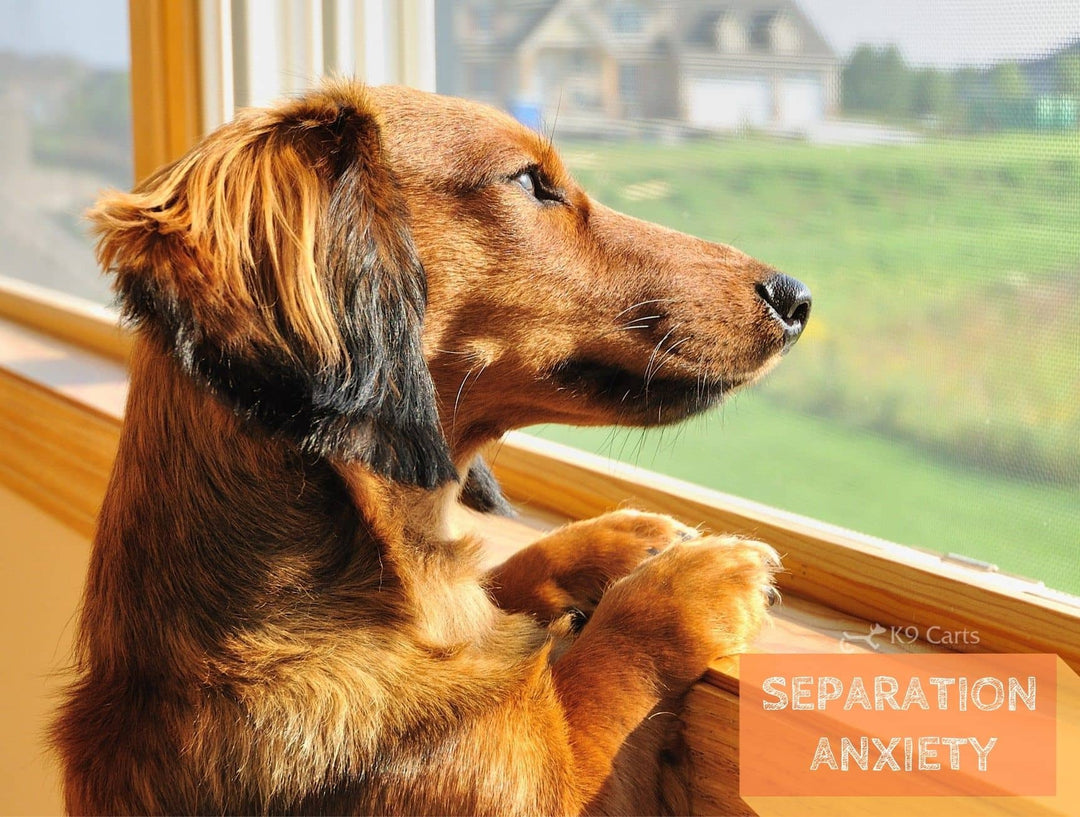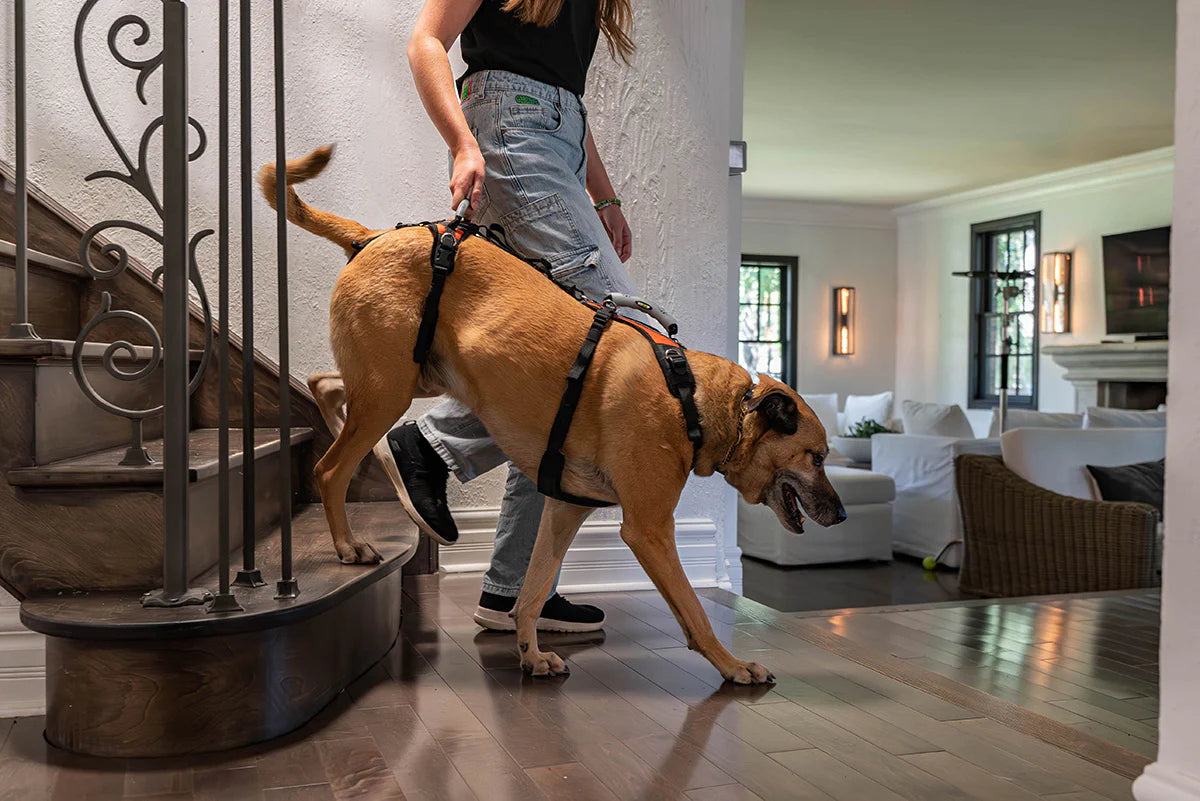Separation Anxiety in Dogs: What It Is and How to Help Treat It

Almost any dog owner will agree that their canine friends seem practically human in many ways, including the ways that they process emotions and react to situations. Unfortunately, this fact means that dogs can fall prey to the same kinds of emotional disorders as humans, including the development of a problem known as separation anxiety.
Separation anxiety can prove devastating for dogs. The more you understand this common problem, the more easily you can recognize the symptoms of separation anxiety in your own dog, and help it overcome those problems. Let's take a look at separation anxiety's causes, effects, remedies, and prevention.
What is Separation Anxiety?
Separation anxiety involves the unreasonable fear of being separated from particular individuals for a significant length of time. This emotional disorder occurs in humans as well as pets (interestingly enough, being separated from a beloved pet can cause anxiety in humans, just as separation from a beloved human can trigger anxiety in a pet).
Pets can also experience anxiety over being left alone in general. Dogs who experience this problem sometimes earn the nickname "Velcro dogs'' for their obsessive desire to stay close to the humans in their lives at all times.
Why Do Dogs Get Separation Anxiety?
The underlying cause of separation anxiety can vary from dog to dog:- In some animals, a traumatic experience at a kennel or boarding facility may have left them extremely gun-shy about any situation that might place them back in that environment.
- In others, a recent death, divorce, or departure for college may have left a dog missing one of his beloved family members for the first time.
- Yet other dogs have never really experienced solitude at all, leaving them totally unprepared for the situation when it finally happens to them.
Which Dogs May Have an Elevated Risk for Separation Anxiety?
While any dog can develop separation anxiety, some may have more vulnerability to it than others. Here are some examples of dogs who may acquire this condition especially easily:- Geriatric dogs - There's a reason for the expression "You can't teach an old dog new tricks." Older dogs are more set in their ways and more resistant to change than younger dogs. When those changes occur, so does anxiety.
- Dogs with pre-existing anxiety issues - If your dog has displayed anxiety triggered by outside events in the past, they may be more prone to separation anxiety. Even if the dog has overcome its anxiety over other issues, a sudden separation could easily trigger this additional problem.
- New members of the family - Have you recently adopted a dog? This new family member may love and appreciate the new surroundings, but may also feel vulnerable and afraid due to the new environment. Shelter rescues who have been abandoned in the past may feel especially sensitive about being left alone again.
- Puppies - Puppies are in a formative period of life, one in which they're experiencing everything for the first time. They're also used to receiving constant love and attention from their mothers. The uncertainty of long lonely spells can "program" them to fear solitude. That's why it's so important to teach your puppy to tolerate separation as a non-threatening experience.
Which Dog Breeds Are More Prone to Separation Anxiety?
Heredity can certainly play a role in a dog's vulnerability to separation anxiety. Humans have bred dogs to display specific traits, some of which may favor the onset of the disorder. Dogs bred for intelligence, companionship, and high energy levels fall into this broad category. Specific breeds prone to separation anxiety include:- Labrador Retrievers - Known as family dogs, Labrador retrievers feel a strong need for social interaction, potentially experiencing anxiety if they don't get it.
- German and Australian Shepherds - These working dogs are both extraordinarily intelligent animals. They also require lots of activity to keep them from getting bored. Without humans to play or work with, separation anxiety sets in.
- Bichon Frise and Toy Poodles - These dogs are bred primarily as companion dogs. Deprived of their companions, they understandably suffer from separation anxiety.
- Cavalier King Charles Spaniels - Another traditional companion dog, the Cavalier King Charles Spaniel also has a natural tendency toward anxiety.
- Jack Russell Terriers - Jack Russell Terriers exhibit ceaseless energy. If they don't have an available human to keep them happily running around, they can develop significant anxiety.
- Border Collies - Border Collies may represent the ultimate combination of high energy and high intelligence. This combination invites separation anxiety.
What Are the Signs of Separation Anxiety in Dogs?
Dogs can act out in some distinctive ways when they're going through a bout of separation anxiety. Watch for the following signs of potential anxiety in your own canine:- Vocalization - An anxious dog will bark, whine, howl, or cry when left alone unexpectedly.
- Property damage - Separation anxiety compels some dogs to chew on furniture, destroy upholstery, or dig holes in flooring and carpeting.
- Inappropriate elimination - Dogs may temporarily forget or ignore their toilet training when plagued by separation anxiety. They may even eat their own feces.
How Can You Treat Separation Anxiety in Dogs?
You may have to train that anxiety out of them through gentle, gradual positive reinforcement. You might start by crating your dog while you're at home working on specific activities. Move on to ever-increasing periods of separation that acclimate your dog to this experience. Make goodbyes and hellos a casual, routine thing instead of a dramatic event.
You can also take steps to make all-day separation more tolerable for your dog. Make sure that plenty of toys and other fun challenges keep your pet occupied while you're gone. If your dog craves human companionship, consider asking a pet sitter, dog walker, or just an available friend or neighbor to spend some daily time with your pet.
Dogs who easily and frequently suffer from anxiety -- and who don't respond to behavioral training -- may need medication to treat that underlying issue. Your veterinarian can evaluate your dog's history and current condition, prescribing anti-anxiety medications as needed.
How Can You Prevent Separation Anxiety From Occurring in the First Place?
You can use the above techniques to train a puppy or newly-adopted dog to accept periods of separation. If you've been spending lots of time at home and you're about to change that routine, consider some pre-emptive separation training, even if your pet has never shown previous hints of separation anxiety.
One of the most important things you can do involves keeping to a regular, consistent schedule. If you make a point of leaving and returning at the same approximate times, your dog will come to expect your departure with a secure sense of when you'll be back. Separations can be hard for all of us, including our four-legged friends.








